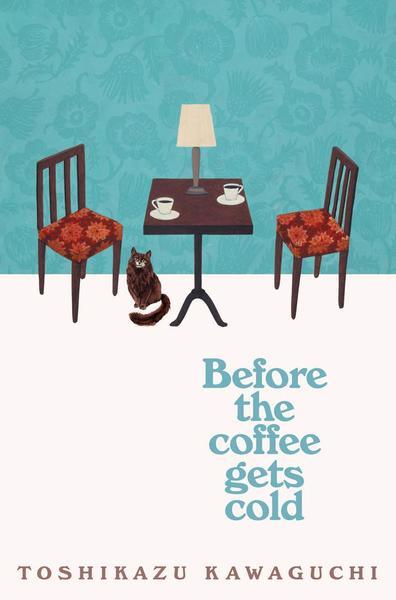Before the Coffee Gets Cold is the first novel in a series about a café in Tokyo called Funiculi Funicula, with one seat at the counter where anyone can travel through time. But there are conditions: You have to wait until the seat is vacant, which is more complicated than it sounds; When you time travel, you’ll be in the same seat at the café, and you can’t get up from it; Anything you do in the past will NOT change the future; And most importantly, you must finish the coffee before it gets cold, or you’ll never be able to return to your own time.
Those are not merely the rules of the time travel seat, they are the terms and conditions you must accept when reading this work of fiction. This is not the kind of story where Biff Tannen can change his fortunes by delivering a copy of Grays Sports Almanac to himself in the past. Indeed, one rule not explicitly mentioned is that you cannot visit your past self. If you were present in the café at the time you are traveling to, there will not be two versions of you there; Only future you will exist, sitting in that special seat.
Now, if you’re like me, the idea that you could go back in time and interact with people, while the past version of you is (presumably) absent, and somehow return to an unchanged future is… frustrating. More than that, the mechanism for how it works is deeply unsatisfying: The universe, somehow, just balances things out. For example, it is explained that if you mortally wound someone in the past, circumstances will align such that they are quickly transported to a hospital where an expert surgeon manages to save their life. I think this hand-waves over a whole lot, but I guess it is a necessary conceit for the kind of story the author is trying to tell: a sort of cozy, relationship-driven time travel tale without the usual world-shattering implications of time travel. This is fantasy, not science fiction, and readers are required to suspend their disbelief and not ask too many questions about how it all works. Fair enough!
Despite the urban fantasy premise, there is very little world-building here. This isn’t a whole magical universe with magical characters. Instead, it’s one small spot where a single kind of magic is possible for anyone who dares to try. There is a small cast of characters: those who work at the café or frequent it, plus the occasional visitor who stumbles upon it. The café is a tiny, basement-level hole-in-the-wall — a classic liminal space where strange things can happen. Its appearance is described with simple, evocative details (low lighting, dark woodwork), and it is easy enough to fill in the blanks with the sounds and smells of your favorite small café. Beyond its walls, we see very little of the outside world, but what we do see is mundane: a normal urban environment, a bit of Japanese countryside. But the mundane surroundings seem to contribute to the feeling that the café, where most of the action takes place, is a charged environment. It is a place where now and then can overlap, where today may bring a visit to the past, or a visitor from the future. The result is that, in a way, we experience the café in 4D, understanding it as a place outside the normal stream of time.
Interestingly, the time travel café is not actually a secret in this world. Toward the beginning of the book, there’s a mention of the café briefly being popular after a newspaper published an article about the magic seat. But interest died out quickly when it became clear that nothing done while visiting the past could actually change anything. If your problems still exist when you return to the present, what is the point?
But the point of this book, I think, is that visiting the past, even within the defined constraints, can affect the future. Not through any sort of butterfly-effect consequences, but solely through the way this experience — speaking with someone who might be long dead, asking questions you regret leaving unasked — impacts the person time traveling. They return to their own time with a fresh perspective that informs how they behave moving forward. In that important way, the book really emphasizes the idea that life is what we make it; that while we may not have agency over everything that happens to us, we are nonetheless free to assign meaning to those events however we wish and act accordingly.
This is a short novel about a small group of characters, but it never feels small. Despite the humble setting and limited cast, I found myself deeply affected by many of the stories, rooting for characters whose desire to change the past, or at least understand it, was very relatable.
Like the café Funiculi Funicula, this book is small but powerful. I’m excited to continue with the next installment in the series soon.
